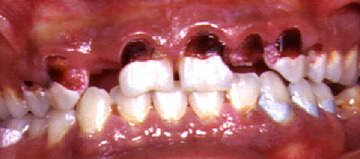| Why Do I Have Dry Mouth? |
 | |

|

|

|

|

|

|

|

WHY DO I HAVE DRY MOUTH?
Dry mouth (technically known as xerostomia) is a condition characterized by a decrease in salivary gland activity and has many causes. Saliva (spit) performs many functions in your mouth. It helps you swallow and digest foods, it aids in wound healing and infection prevention, it protects your teeth and gums from decay and periodontal diseases and it makes wearing dentures more comfortable. Many prescription medications, radiation therapy, some diseases (such as Sjogren's syndrome) and aging can all contribute to dry mouth. More often than not, any particular medication will have dry mouth listed as one of its side effects.
Dry mouth, depending on its severity and duration, can seriously impair your oral health. Saliva defends your teeth and gums from disease in many ways. It is part of your immune system and contains antibodies that guard against the bacteria in your mouth that cause tooth decay and gum problems. It lubricates your mouth and helps wash away food particles from your teeth and gums that these bacteria feed on. Saliva also contains calcium and phosphates that can help to repair the damage caused by early decay.
Whatever the reason, if you have a significant case of dry mouth you will have problems with tooth decay and gum disease. If you wear full dentures, they will not fit as comfortably or function as well as if you had normal salivary flow. There are many steps that can be taken to prevent these problems. In some cases, causative medications can be changed or dosages altered. Studies have shown that regular chewing of sugarless gum sweetened with sorbitol, especially after eating, can stimulate salivary flow and reduce the incidence of tooth decay. There are also prescription medications that can be used to enhance saliva production. In cases of extreme dryness, when salivary gland function is almost nonexistent, an over the counter oral moisturizer (Saliva Substitute/Roxane Labs) can be used. This type of product will aid in swallowing, cleansing of food particles and denture wear, but it will not replace natural saliva's immune and regenerative properties.

Gum line decay caused by severe dry mouth due to radiation therapy.
If your natural salivary output is insufficient or absent and cannot be corrected, other measures will be required. Prescription
fluoride treatments and more frequent cleanings here in our office will be needed. You will need to use a fluoride rinse at home and perform your home care more often. You will need to avoid decay causing foods such as sugary sweets. You may need to use a prescription oral disinfectant rinse to treat any related gum conditions.
As with any oral problem, it is better to prevent dry mouth and its complications than to try to correct them after they start. When dry mouth occurs, its cause should be found and eliminated immediately. If this is not possible (as with radiation therapy), then the preventive steps outlined above should be started at once. Dry mouth need not be a problem if it is handled properly. If you have had or begin to have problems with dry mouth, inform Dr. McArdle immediately.
|

|
|
|

|

|

|

|
Dr. Barry F. McArdle, D.M.D. - General Dentist P.A. - mcardledmd.com
 |

|

|

|

|

|

|

|

|

|

|

|

|

|
118 Maplewood Avenue, The Captain Moses House, Suite B-7, Portsmouth, NH 03801 - (603) 430-1010
©1997-2006 Dr. Barry F. McArdle, D.M.D. General Dentist P.A., All Rights Reserved.
| |


